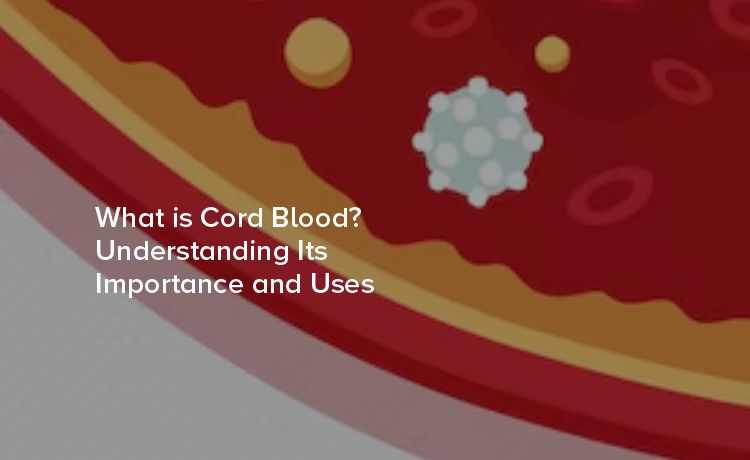
Cord blood is a term that often pops up during pregnancy and childbirth, but many are still in the dark about its importance and uses. While it may seem like just another medical term, the reality is that cord blood holds remarkable potential in the world of medicine.
Cord blood, otherwise known as umbilical cord blood, is the blood that remains in the umbilical cord and placenta after childbirth. Unlike regular blood, cord blood is rich in stem cells, which are the building blocks of our blood and immune systems. These stem cells can develop into different types of blood cells, making them incredibly valuable for treating various medical conditions.
The process of collecting cord blood is simple and painless for both the mother and baby. After the umbilical cord is clamped and cut, the blood is extracted from the cord using a sterile needle. This blood is then stored in a cord blood bank for future use.
Cord blood is often referred to as a biological treasure trove due to its rich supply of hematopoietic stem cells (HSCs). These HSCs have the unique ability to differentiate into various types of blood cells, including red blood cells, white blood cells, and platelets. This versatility makes cord blood a powerful tool in regenerative medicine and therapies.
Additionally, cord blood contains mesenchymal stem cells (MSCs), which can develop into bone, cartilage, and fat cells. These MSCs open up a whole new world of possibilities for treating conditions like bone defects, cartilage damage, and more.
The importance of cord blood lies in its ability to treat a wide range of diseases and conditions. Since the 1980s, doctors have successfully used cord blood transplants to treat diseases such as leukemia, lymphoma, and certain inherited metabolic disorders. Unlike bone marrow transplants, cord blood transplants are less likely to cause complications, making them a preferable option for many patients.
Another significant advantage of cord blood is its accessibility. Collecting cord blood is a much simpler and less invasive procedure compared to bone marrow extraction. This ease of collection makes it more readily available, increasing the chances of finding a suitable match for patients in need.
Cord blood has found its place in treating numerous medical conditions. Its primary use is in hematopoietic stem cell transplants, which are used to treat diseases affecting the blood and immune systems. Patients with leukemia, lymphoma, sickle cell anemia, and certain immune disorders have benefited greatly from cord blood transplants.
In addition to treating blood-related diseases, cord blood is also being explored for its potential in regenerative medicine. Researchers are investigating its use in repairing damaged tissues, treating neurological disorders, and even reversing the effects of certain genetic conditions.
Cord blood banking involves collecting and storing cord blood for future medical use. There are two types of cord blood banks—public and private. Public cord blood banks collect and store donated cord blood for use by anyone in need, while private cord blood banks store cord blood exclusively for the donor’s family.
Public banking is generally free of charge, and the donated cord blood becomes part of a larger registry, increasing the chances of finding a match for patients worldwide. On the other hand, private banking comes with a fee, but it ensures that the cord blood is reserved for the donor’s family, providing a sense of security and peace of mind.
If you’re considering donating or storing cord blood, the first step is to discuss your options with your healthcare provider. They can provide information on available cord blood banks and guide you through the process. Whether you choose public or private banking, the collection process remains the same.
To donate cord blood to a public bank, you’ll need to register with a participating hospital or cord blood bank. This process usually involves completing a consent form and undergoing a brief health screening. Once your donation is accepted, the cord blood will be collected after childbirth and sent to the bank for processing and storage.
Cord blood transplants have revolutionized the treatment of many life-threatening diseases. The procedure involves replacing a patient’s diseased or damaged bone marrow with healthy cord blood stem cells. These stem cells then migrate to the patient’s bone marrow, where they begin producing healthy blood cells.
One of the key benefits of cord blood transplants is their ability to treat patients who cannot find a suitable bone marrow donor. Cord blood stem cells are more adaptable and less likely to cause graft-versus-host disease (GVHD), a common complication of bone marrow transplants.
While the potential of cord blood is immense, it’s essential to consider the ethical implications of its use. Issues such as informed consent, equitable access to treatments, and the long-term storage of cord blood need to be carefully addressed. Ensuring that all patients have access to these life-saving treatments, regardless of their financial situation, is a critical aspect of ethical cord blood use.
Additionally, the use of cord blood in research and therapy must be conducted with transparency and respect for the donor’s wishes. Ethical guidelines and regulations play a crucial role in ensuring that cord blood is used responsibly and for the greater good.
Getting involved in the world of cord blood is easier than you might think. Whether you’re an expectant parent considering donation, or someone interested in supporting cord blood research, there are several ways to contribute.
Donating cord blood is a simple yet impactful way to make a difference. By choosing to donate, you’re giving others a chance at life. Additionally, supporting organizations that promote cord blood awareness and research can help advance this field and bring new treatments to those in need.
Cord blood is a precious resource with the potential to transform lives. Its versatility and therapeutic potential make it a valuable tool in the fight against various diseases. By understanding the importance and uses of cord blood contact with gynaecology hospital in Hyderabad, you can make informed decisions about donation, storage, and support for ongoing research.